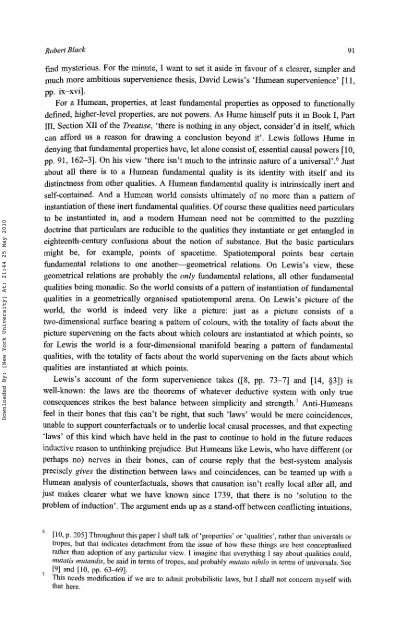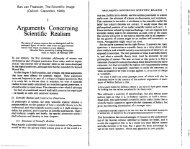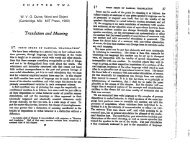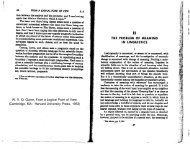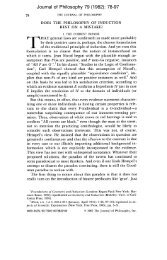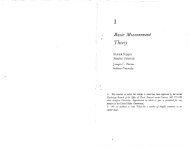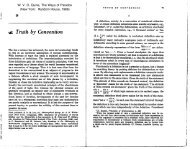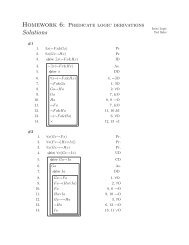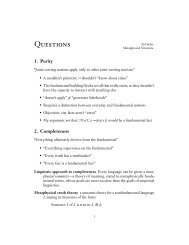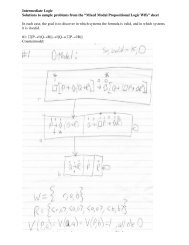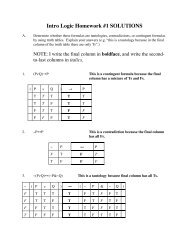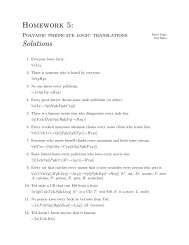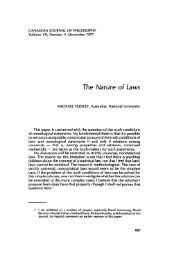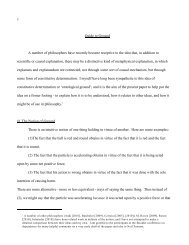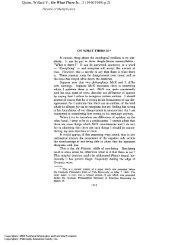Black - against quidditism.pdf - Ted Sider
Black - against quidditism.pdf - Ted Sider
Black - against quidditism.pdf - Ted Sider
Create successful ePaper yourself
Turn your PDF publications into a flip-book with our unique Google optimized e-Paper software.
Downloaded By: [New York University] At: 21:44 25 May 2010<br />
Robert <strong>Black</strong> 91<br />
find mysterious. For the minute, I want to set it aside in favour of a clearer, simpler and<br />
much more ambitious supervenience thesis, David Lewis's 'Humean supervenience' [11,<br />
pp. ix-xvi].<br />
For a Humean, properties, at least fundamental properties as opposed to functionally<br />
defined, higher-level properties, are not powers. As Hume himself puts it in Book I, Part<br />
III, Section XII of the Treatise, 'there is nothing in any object, consider'd in itself, which<br />
can afford us a reason for drawing a conclusion beyond it'. Lewis follows Hume in<br />
denying that fundamental properties have, let alone consist of, essential causal powers [10,<br />
pp. 91,162-3]. On his view 'there isn't much to the intrinsic nature of a universal'. 6 Just<br />
about all there is to a Humean fundamental quality is its identity with itself and its<br />
distinctness from other qualities. A Humean fundamental quality is intrinsically inert and<br />
self-contained. And a Humean world consists ultimately of no more than a pattern of<br />
instantiation of these inert fundamental qualities. Of course these qualities need particulars<br />
to be instantiated in, and a modem Humean need not be committed to the puzzling<br />
doctrine that particulars are reducible to the qualities they instantiate or get entangled in<br />
eighteenth-century confusions about the notion of substance. But the basic particulars<br />
might be, for example, points of spacetime. Spatiotemporal points bear certain<br />
fiandamental relations to one another--geometrical relations. On Lewis's view, these<br />
geometrical relations are probably the only fundamental relations, all other fundamental<br />
qualities being monadic. So the world consists of a pattern of instantiation of fundamental<br />
qualities in a geometrically organised spatiotemporal arena. On Lewis's picture of the<br />
world, the world is indeed very like a picture: just as a picture consists of a<br />
two-dimensional surface bearing a pattern of colours, with the totality of facts about the<br />
picture supervening on the facts about which colours are instantiated at which points, so<br />
for Lewis the world is a four-dimensional manifold bearing a pattern of fundamental<br />
qualities, with the totality of facts about the world supervening on the facts about which<br />
qualities are instantiated at which points.<br />
Lewis's account of the form supervenience takes ([8, pp. 73-7] and [14, §3]) is<br />
well-known: the laws are the theorems of whatever deductive system with only true<br />
consequences strikes the best balance between simplicity and strength. 7 Anti-Humeans<br />
feel in their bones that this can't be right, that such 'laws' would be mere coincidences,<br />
unable to support counterfactuals or to underlie local causal processes, and that expecting<br />
'laws' of this kind which have held in the past to continue to hold in the future reduces<br />
inductive reason to unthinking prejudice. But Humeans like Lewis, who have different (or<br />
perhaps no) nerves in their bones, can of course reply that the best-system analysis<br />
precisely gives the distinction between laws and coincidences, can be teamed up with a<br />
Humean analysis of counterfactuals, shows that causation isn't really local after all, and<br />
just makes clearer what we have known since 1739, that there is no 'solution to the<br />
problem of induction'. The argument ends up as a stand-offbetween conflicting intuitions,<br />
[10, p. 205] Throughout this paper I shall talk of 'properties' or 'qualities', rather than universals or<br />
tropes, but that indicates detachment from the issue of how these things are best conceptualised<br />
rather than adoption of any particular view. I imagine that everything I say about qualities could,<br />
mutatis mutandis, be said in terms of tropes, and probably mutato nihilo in terms of universals. See<br />
[9] and [10, pp. 63-69].<br />
This needs modification if we are to admit probabilistic laws, but I shall not concern myself with<br />
that here.


